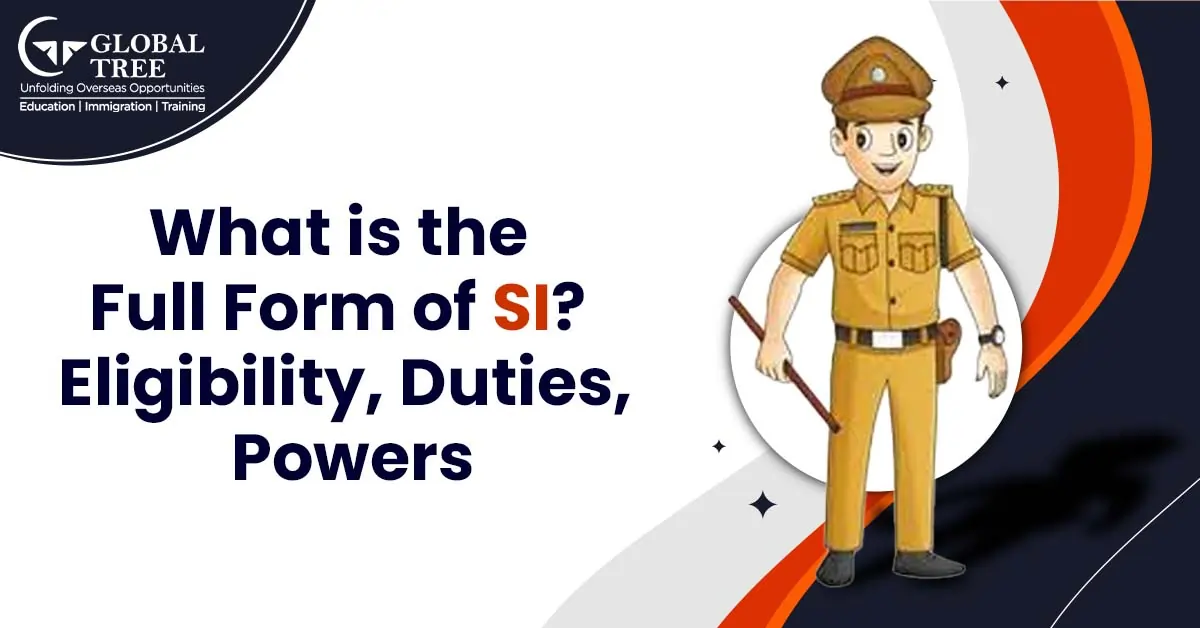What is the Full Form of SI? How to become SI, Duties & Powers

- SI Full Form
- Understanding the Role of a Sub-Inspector
- How can I become SI in Police Department?
- Recruitment Process
- Duties and Responsibilities of a Sub-Inspector
- Powers of a Sub-Inspector
- Training and Development
- Challenges Faced by Sub-Inspectors
- The Impact of Sub-Inspectors on Society
- Technological Advancements in Policing
- Career Progression
- Conclusion
- FAQs
SI Full Form
The full form of SI is Sub-Inspector. This position is crucial in maintaining law and order, ensuring justice, and executing various legal procedures. In the intricate hierarchy of law enforcement agencies, various ranks and titles play pivotal roles, each with distinct responsibilities and powers. One such significant rank is that of the "SI."
This comprehensive article delves into the role of a Sub-Inspector, outlining the eligibility criteria, duties, powers, and additional relevant information, catering to students and aspiring law enforcement officers.
Understanding the Role of a Sub-Inspector
A Sub-Inspector (SI) is a critical rank within the police force, often considered the backbone of law enforcement operations. SIs play a crucial role in bridging the gap between senior officers and the constabulary. They are typically responsible for leading a police station or a particular area within a station, managing the team of constables, and ensuring the effective implementation of law and order.
How can I become SI in Police Department?
The journey to becoming a Sub-Inspector involves meeting specific eligibility criteria, which may vary slightly depending on the country or state.
Here are the generic requirements for anyone who are looking to be SI. These requirements are also applicable for students who are looking for How to become SI after 12th.
1. Educational Qualifications
Minimum Requirement: A candidate must have at least a bachelor's degree from a recognized university.
Preferred Qualifications: Degrees in fields such as criminology, law, or public administration may be advantageous.
2. Age Limit
General Category: The typical age range is 20 to 25 years.
Reserved Categories: Age relaxation is often provided to candidates from SC/ST/OBC categories, usually extending up to 30 years.
3. Physical Standards
Height and Chest Measurements: There are specific height and chest measurement requirements, varying by gender and category.
Physical Fitness: Candidates must pass physical endurance tests, including running, long jump, and high jump.
4. Nationality
Candidates must be citizens of the respective country where they are applying for the position.
Recruitment Process
The recruitment process for a Sub-Inspector generally involves several stages:
- Written Examination: Consists of multiple-choice questions on general knowledge, quantitative aptitude, reasoning, and good language skills.
- Physical Efficiency Test (PET): Includes physical tasks like running, long jump, and high jump.
- Interview/Personality Test: Assesses the candidate's mental aptitude, decision-making skills, and suitability for the role.
- Medical Examination: Ensures the candidate is medically fit for the duties of a Sub-Inspector.
Duties and Responsibilities of a Sub-Inspector
A Sub-Inspector's role is multifaceted, encompassing a wide range of duties aimed at maintaining law and order, preventing crime, and ensuring justice. The primary responsibilities include:
1. Law Enforcement
Crime Prevention: Patrolling assigned areas to deter criminal activities.
Investigations: Conducting thorough investigations into criminal cases, collecting evidence, and preparing reports.
2. Administrative Duties
Station Management: Overseeing the daily operations of a police station, ensuring all activities are carried out efficiently.
Record Keeping: Maintaining accurate records of complaints, investigations, arrests, and other relevant activities.
[Suggested Read: How to Develop Personality? A Well Guided List of 15 Tips]
3. Public Interaction
Community Policing: Engaging with the community to foster trust and cooperation, addressing public grievances.
Dispute Resolution: Mediating conflicts and disputes within the community, aiming for peaceful resolutions.
4. Judicial Responsibilities
Court Duties: Presenting cases in court, providing evidence, and testifying as a witness.
Warrant Execution: Serving legal documents such as warrants and subpoenas.
Powers of a Sub-Inspector
A Sub-Inspector wields considerable authority to perform their duties effectively. These powers include:
1. Arrest Powers
Without Warrant: The power to arrest individuals suspected of committing cognizable offenses without a warrant.
With Warrant: Executing arrest warrants issued by the court.
2. Search and Seizure
Search Premises: Conducting searches of properties or individuals suspected of criminal involvement.
Seizure of Evidence: Confiscating items that may be used as evidence in criminal cases.
3. Investigation Authority
Interrogation: Questioning suspects and witnesses to gather information related to criminal activities.
Case Filing: Registering FIRs (First Information Reports) and preparing charge sheets.
[Suggested Read: How to Study in Bachelor of Technology in Forensic Investigation?]
4. Public Order Maintenance
Crowd Control: Managing large gatherings, protests, or any public disturbances.
Emergency Response: Acting promptly in emergency situations to protect life and property.
Training and Development
After selection, Sub-Inspectors undergo rigorous training programs designed to equip them with the necessary skills and knowledge. Training typically includes:
- Physical Training: Enhances fitness levels and endurance.
- Firearms Training: Teaches the proper use of firearms and other weapons.
- Legal Education: Provides in-depth knowledge of laws, regulations, and judicial procedures.
- Communication Skills: Develops effective communication and interpersonal skills.
Challenges Faced by Sub-Inspectors
The role of a Sub-Inspector is demanding and fraught with challenges, including:
1. High Stress Levels
Managing crime, emergencies, and public expectations can be extremely stressful. The need to remain calm and composed under pressure is paramount.
2. Risk of Injury
Facing dangerous situations, including violent confrontations and hazardous environments, is a common aspect of the job. The risk of physical harm is ever-present.
3. Work-Life Balance
Irregular hours and on-call duties can impact personal life and well-being. Sub-Inspectors often work long hours and may be called upon during holidays and weekends.
[Suggested Read: How to study Police course abroad?]
The Impact of Sub-Inspectors on Society
Sub-Inspectors play a pivotal role in maintaining societal stability and ensuring the safety of citizens. Their contributions include:
1. Crime Reduction
Effective law enforcement helps in reducing crime rates. By patrolling neighborhoods, investigating crimes, and apprehending offenders, SIs contribute to a safer community.
2. Justice Delivery
Ensuring that criminals are apprehended and brought to justice is a core responsibility. SIs play a critical role in the judicial process, from investigation to court proceedings.
3. Community Trust
Building a trustworthy relationship between the police force and the community is essential. Through community policing and engagement, SIs foster trust and cooperation, which are vital for effective law enforcement.
Technological Advancements in Policing
The integration of technology in policing has revolutionized the way Sub-Inspectors perform their duties. Innovations include:
1. Forensic Science
Advanced forensic techniques aid in solving complex cases. SIs use forensic evidence to build strong cases against offenders, ensuring that justice is served.
2. Digital Policing
Use of digital tools for record-keeping, surveillance, and communication has streamlined many aspects of law enforcement. Technology such as body cameras, databases, and communication systems enhances efficiency and transparency.
[Suggested Read: How to Become a Lawyer after 12th?]
3. Cybercrime Units
Special units dedicated to tackling cybercrimes reflect the evolving nature of criminal activities. SIs in these units address issues such as online fraud, hacking, and digital extortion.
Career Progression
Sub-Inspectors have various opportunities for career advancement within the police force. Possible promotions include:
1. Inspector
After gaining experience, SIs can be promoted to Inspectors, handling larger jurisdictions and more complex cases. This position comes with increased responsibilities and authority.
2. Deputy Superintendent of Police (DSP)
With further experience and additional qualifications, SIs can rise to higher ranks such as DSP. This role involves overseeing multiple police stations and managing broader law enforcement strategies.
Conclusion
The position of a Sub-Inspector is integral to the functioning of the police force, ensuring law and order, and protecting citizens. Aspiring candidates must meet specific eligibility criteria and undergo rigorous training to prepare for this challenging yet rewarding role. With opportunities for career advancement and the evolving nature of law enforcement, the role of a Sub-Inspector continues to be vital in maintaining societal stability and justice.
[Read More: How to Write a Formal Letter? ]
FAQs
Q1: What is the minimum educational qualification required to become a Sub-Inspector?
The minimum educational qualification is a bachelor's degree from a recognized university.
Q2: Are there any age relaxations for reserved category candidates?
Yes, age relaxations are typically provided for SC/ST/OBC candidates.
Q3: What are the primary physical tests required for Sub-Inspector candidates?
Physical tests usually include running, long jump, and high jump.
Q4: Can a Sub-Inspector arrest someone without a warrant?
Yes, a Sub-Inspector has the authority to arrest individuals without a warrant if they are suspected of committing cognizable offenses.
Q5: What kind of training does a Sub-Inspector undergo after selection?
Training includes physical training, firearms training, legal education, and communication skills development.
Q6: What are some common challenges faced by Sub-Inspectors?
Common challenges include high stress levels, risk of injury, and maintaining work-life balance.
Q7: How does technology aid Sub-Inspectors in their duties?
Technology aids through forensic science, digital policing tools, and specialized cybercrime units.
Q8: What is the scope for career advancement for a Sub-Inspector?
Career advancement can lead to higher ranks such as Inspector and Deputy Superintendent of Police.
Q9: What is the selection process for a Sub-Inspector?
The selection process typically involves a written exam, a physical efficiency test, a medical examination, and an interview.
Q10: What are the educational qualifications needed for specific Sub-Inspector positions in different departments?
Depending on the department (e.g., Criminal Investigation, Traffic Police, etc.), specific additional qualifications or skills may be required.
Q11: What is the salary structure for a Sub-Inspector?
The salary of a Sub-Inspector varies depending on the state and department but typically includes basic pay, allowances, and benefits like housing and medical insurance.
Q12: Can a Sub-Inspector be transferred to different locations?
Yes, Sub-Inspectors can be transferred to different police stations or departments as per the needs of the police force.
Q13: What is the role of a Sub-Inspector in maintaining law and order?
A Sub-Inspector plays a crucial role in enforcing laws, investigating crimes, maintaining peace, and assisting senior officers in their duties.
Q14: Are there any specific skills required to be a successful Sub-Inspector?
Key skills include problem-solving, decision-making, effective communication, leadership, and physical fitness.
Q15: How often do Sub-Inspectors receive promotions or raises?
Promotions and raises are typically based on experience, performance, and departmental requirements, with the opportunity for advancement to higher ranks after a certain number of years.
Q16: Can a Sub-Inspector work in specialized units within the police force?
Yes, Sub-Inspectors can work in specialized units like anti-terrorism, cybercrime, or narcotics, depending on their experience and training.
Q17: What are the working hours for a Sub-Inspector?
Working hours can vary based on the department and shifts, and Subcontractors may be required to work during nights, weekends, and holidays.
Q18: How does a Sub-Inspector maintain public relations?
Sub-Inspectors maintain public relations by engaging with the community, addressing concerns, and ensuring that the public is aware of police initiatives and support available to them.
Q19: Is there a possibility of international assignments for a Sub-Inspector?
In some instances, Sub-Inspectors with specialized skills (e.g., cybercrime) may be assigned to international assignments or collaborative efforts with foreign agencies.
Q20: What are the ethical standards a Sub-Inspector is expected to follow?
Sub-Inspectors are expected to uphold high ethical standards, maintain integrity, follow the law, and treat everyone fairly and impartially.









